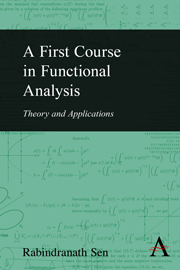Book contents
- Frontmatter
- Preface
- Contents
- Introduction
- I Preliminaries
- II Normed Linear Spaces
- III Hilbert Space
- IV Linear Operators
- V Linear Functionals
- VI Space of Bounded Linear Functionals
- VII Closed Graph Theorem and Its Consequences
- VIII Compact Operators on Normed Linear Spaces
- IX Elements of Spectral Theory of Self-Adjoint Operators in Hilbert Spaces
- X Measure and Integration in Lp Spaces
- XI Unbounded Linear Operators
- XII The Hahn-Banach Theorem and Optimization Problems
- XIII Variational Problems
- XIV The Wavelet Analysis
- XV Dynamical Systems
- List of Symbols
- Bibliography
- Index
- Frontmatter
- Preface
- Contents
- Introduction
- I Preliminaries
- II Normed Linear Spaces
- III Hilbert Space
- IV Linear Operators
- V Linear Functionals
- VI Space of Bounded Linear Functionals
- VII Closed Graph Theorem and Its Consequences
- VIII Compact Operators on Normed Linear Spaces
- IX Elements of Spectral Theory of Self-Adjoint Operators in Hilbert Spaces
- X Measure and Integration in Lp Spaces
- XI Unbounded Linear Operators
- XII The Hahn-Banach Theorem and Optimization Problems
- XIII Variational Problems
- XIV The Wavelet Analysis
- XV Dynamical Systems
- List of Symbols
- Bibliography
- Index
Summary
Functional analysis is an abstract branch of mathematics that grew out of classical analysis. It represents one of the most important branches of the mathematical sciences. Together with abstract algebra and mathematical analysis, it serves as a foundation of many other branches of mathematics. Functional analysis is in particular widely used in probability and random function theory, numerical analysis, mathematical physics and their numerous applications. It serves as a powerful tool in modern control and information sciences.
The development of the subject started from the beginning of the twentieth century, mainly through the initiative of the Russian school mathematicians. The impetus came from the developments of linear algebra, linear ordinary and partial differential equations, calculus of variation, approximation theory and, in particular, those of linear integral equations, the theory of which had the greatest impact on the development and promotion of modern ideas. Mathematicians observed that problems from different fields often possess related features and properties. This allowed for an effective unifying approach towards the problems, the unification being obtained by the omission of inessential details. Hence the advantage of such an abstract approach is that it concentrates on the essential facts, so that they become clearly visible.
Information
- Type
- Chapter
- Information
- A First Course in Functional AnalysisTheory and Applications, pp. xvii - xviiiPublisher: Anthem PressPrint publication year: 2013
